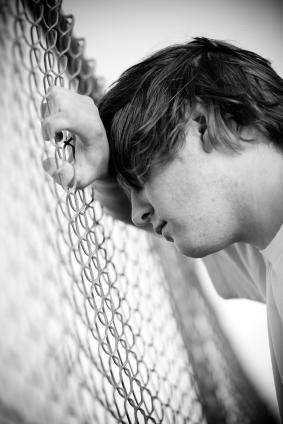
Depression in adolescents can be tricky to diagnose, but almost nine percent of teenagers will experience depression. Since adolescent depression can mimic the changes naturally occurring during this time in your teenager's life, medical professionals might dismiss depression symptoms as teenage angst or mood swings. It's important for parents to be aware of any significant changes in their children's mood or behavior.
Mood Symptoms
Mood swings are a common occurrence in teenagers. However, extreme mood swings can be indicative of major depression. A teenager with depression may begin to isolate herself from family and friends, choosing to spend a majority of her time alone. Your normally happy teenager may begin to have unexplained outbursts of anger or crying. She may become hostile, yelling and screaming if you ask her to clean her room. Extreme sensitivity to criticism is another red flag to watch for if you suspect your teenager is dealing with depression. She might burst into tears if you tell her a certain shirt does not match her pants or question her choice of hairstyle. In extreme cases, this could lead to increased isolation or a physical altercation with you.
Behavior Symptoms
The adolescent years are a time of challenging behaviors and testing parental limits. Depressed teenagers are more likely to push limits than their happier counterparts. Depressed teens might run away as a cry for help or attention. Judgment becomes confused and impaired, leading to questionable decisions. Your depressed adolescent may suddenly quit sports teams or after school clubs, only to complain of boredom the next day. Your teenager may begin to engage in reckless and dangerous behaviors, such as drinking, drug abuse or other criminal behaviors. This is usually due to a lack of feelings for himself and others. You may also notice a decrease in school grades or attendance due to feelings of apathy and unwillingness to make an effort to study.
Physical Symptoms
Depression can manifest into a physical form for some adolescents. Your teenager might complain of headaches, stomachaches or other body aches, but she will be unable to pinpoint a cause for her ill feelings. Some adolescents will develop psychosomatic symptoms or illnesses that do not respond to any medical treatment, as the underlying cause is depression. Your teenager may begin to lose or gain weight, depending on how the depression affects his appetite. Some teenagers will begin to overeat as a way to deal with the feelings of sadness and disparity. Other teenagers, usually girls, may stop eating, especially if their depression is linked to body image issues.
Symptoms of Serious Concern
Depression in adolescents is definitely a cause for concern, and you should get involved and attempt to get help for your teenager as soon as possible. Certain symptoms of depression, however, are cause for immediate concern. If your teenager begins self-mutilating, has a preoccupation with death, dying and suicide, or talks about committing suicide, you should seek immediate help through your doctor or hospital emergency room. About 17 percent of teenagers think about suicide at some point in their life, and almost 10 percent will follow through with suicidal action. Some warning signs to look for in your teenager regarding suicide are:
- Giving away meaningful or special objects
- An increase in anxiety and nervousness
- Sudden change in moods, from sad to happy and calm. This is usually after your teenager has made a plan and feels life will get better after her death.
- Any statement eluding to dying, death or taking his own life
If you notice any of the above symptoms or have any personal concerns regarding your adolescent's well being and mental state, contact your doctor, local emergency room or the police immediately to prevent any tragic action from occurring.







